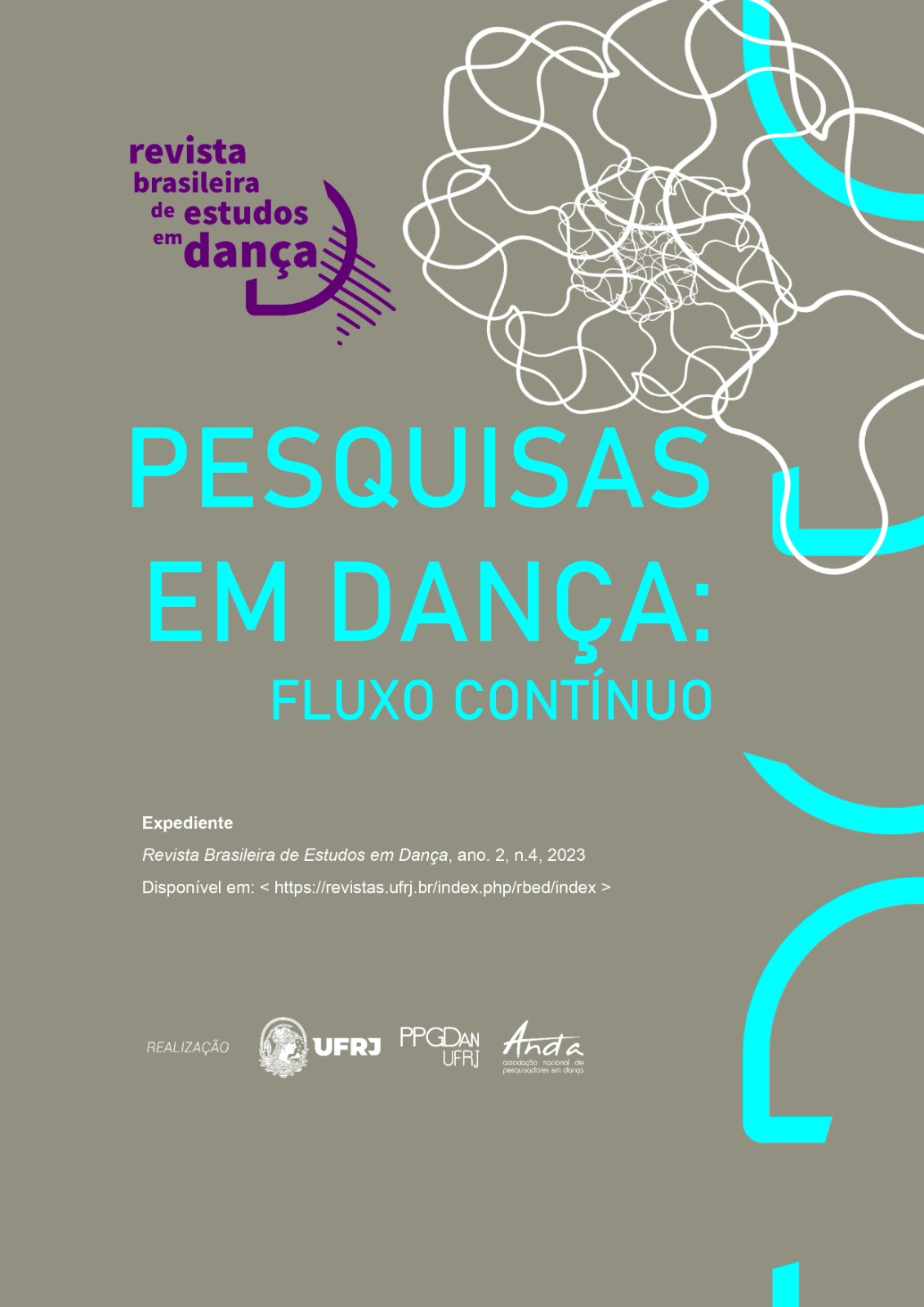Dancing Book for Improvising and Composing
expanded and connective (choreo)graphic dramaturgy - from book to action
DOI:
https://doi.org/10.58786/rbed.2023.v2.n4.62355Keywords:
dance, improvisation, dance composition, expanded dramaturgy, connectivityAbstract
This article refers to the experience of Mulheres da Improvisação concerning the writing and different uses of the Livro de Dançar: Cartas para Improvisar e Compor (Dancing Book: letters to improvise and compose, 2022). Its writing was based on the connection between distinct investigative interests, and from this unfolds the multiplicity of its uses, emerging expanded and connective dramaturgies when the cards are tried (Araújo; Didonet, 2021; Vieira, 2021; Santana; Mascarenhas Et Al., 2021; Tourinho, 2021; De Laet, 2018). We discussed these developments of the Livro de Dançar on various occasions with predictable or unpredictable uses. Different formats of releases and classes in other cities and occasions triggered differences in how the book can be read and performed. We reflect on how new study interests, archives, corporealities, and technical and aesthetic repertoires are connected, through which the text becomes experience and dramaturgy expands spaces and times.
Downloads
References
ARAÚJO, Laura Castro de; DIDONET, Candice. A Dramaturgia Expandida: um campo aberto de (in)definições. Dramaturgia em foco, Petrolina-PE, v. 5, n. 1, p. 34-50, 2021.Petrolina-PE, 202. Disponível em: https://www.periodicos.univasf.edu.br/index.php/dramaturgiaemfoco/article/view/1460
Acesso em: 23 jun. 2023.
DE LAET, T. Corpos co(se)m memórias: estratégias de re-enactment na dança contemporânea. Moringa – Artes do Espetáculo, João Pessoa, v. 9, n. 2, 2018, p. 133-153. Disponível em: http://www.periodicos.ufpb.br/ojs2/index.php/moringa/article/view/43632. Acesso em: 23 jun. 2023.
MARQUES, Roberta Ramos. Uma biblioteca de dança “mais na carne”: histórias dissonantes das experiências com a dança para vidas presentes. Dança: Revista Do Programa de Pós-Graduação em Dança, Salvador, vol. 6, n. 9, p. 74–98, 2021. Disponível em: https://doi.org/10.9771/2317-3777dana.v6i1.47564. Acesso em: 23 jun. 2023.
MORAIS, L.A. Emergências cênicas em dança: a conectividade entre dançarinos no momento cênico improvisado. Dissertação de Mestrado - PPGDança-UFBA, 2010. Disponível em: https://repositorio.ufba.br/handle/ri/8328. Acesso em: 19 nov. 2023.
SANTANA, Ivani Lúcia Oliveira de; MASCARENHAS, George et al. Repertório, Salvador, ano 24, n. 36, p. 1-346, 2021.1. Disponível em: https://periodicos.ufba.br/index.php/revteatro/issue/view/2208/731. Acesso em: 23 jun. 2023.
SCHELL, Jesse. A arte do game design: o livro original. Rio de Janeiro: Elsevier, 2011.
TOURINHO, L. L. Dramaturgias do Corpo: Protocolos de Criação das Artes da Cena e do Movimento. Repertório, [S. l.], v. 1, n. 37, 2022. DOI: 10.9771/rr.v1i37.38194. Disponível em: https://periodicos.ufba.br/index.php/revteatro/article/view/38194. Acesso em: 19 nov. 2023.
VIEIRA, Mariane Araújo. Dramaturgia da improvisação: reflexões de um fazer composicional. 2021. 187f. Dissertação (Mestrado em Artes Cênicas) – Pós-Graduação em Artes Cênicas, Universidade Federal de Uberlândia, Uberlândia, 2021. Disponível em: https://repositorio.ufu.br/handle/123456789/31535. Acesso em: 23 jun. 2023.
Downloads
Published
How to Cite
Issue
Section
License
Authors who publish in the Revista Brasileira de Estudos em Dança are
responsible for the content of signed articles and retain copyright.
They grant the journal the right of first publication with the work simultaneously
licensed under the Creative Commons Attribution-NonCommercial 4.0 License
(Open Archives Initiative - OAI). This feature, used for open-access journals,
allows sharing work for non-commercial purposes and acknowledges
authorship. If the text is later published in another vehicle, the author
must inform that it was initially published as an article in the Revista Brasileira
de Estudos em Dança. Therefore, even if the journal owns the first publication,
authors are entitled to publish their work in institutional repositories or on
their personal pages, even if the editorial process has not been completed.
The journal reserves the right to make normative, orthographic, and grammatical changes to maintain the language standard, respecting the authorial style.

